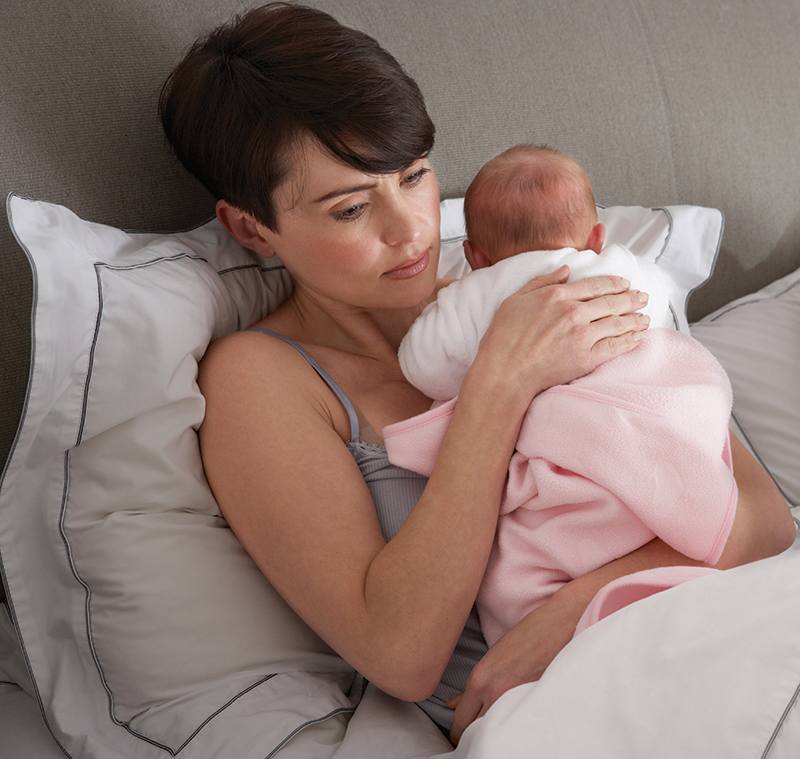 When you’re sporting a baby bump or holding a brand-new bundle, sleep advice abounds. Good advice? Not so much. Tips are lobbed at new parents with such force that it can be hard to sort fact from fiction — but getting to the bottom of these tall tales means better rest, less worry and savvier parenting.
When you’re sporting a baby bump or holding a brand-new bundle, sleep advice abounds. Good advice? Not so much. Tips are lobbed at new parents with such force that it can be hard to sort fact from fiction — but getting to the bottom of these tall tales means better rest, less worry and savvier parenting.
Myth: You’ll never sleep again.
Truth: You’ll find a way.
Even if you don’t hit the jackpot with a baby who sleeps long stretches from the get-go, you don’t necessarily need to resign yourself to years of zombie status. As it turns out, certain survival skills kick in when there’s a tiny person depending on you: You adapt. In the weary world of new parenting, this means learning to live on a bit less sleep, grabbing rest when you can and enlisting any available help.
Maple Valley mom of two Lindsay Karns did all of the above. “I would go to bed around 8, and my husband would take a shift until Olive’s next feeding, around midnight. He would be able to get some solid hours in from midnight on,” Karns says. “[Those] four hours straight would do wonders for me, and him as well.”
Another get-more-sleep secret — sleeping near baby — is backed by the American Academy of Pediatrics, whose 2011 policy statement recommends that infants sleep in a crib or bassinet in the parents’ bedroom.
Myth: Babies take regular naps and bed down early.
Truth: Babies sleep when they want to.
New parents are sometimes shocked to learn that a newborn can start out sleeping 16–20 hours per day. Just as shocking is the realization that those hours may have no discernible pattern at first. “In the first few weeks of life, there is no nighttime or daytime pattern. Sleep periods are distributed throughout the day and night,” says Preetam Bandla, M.D., clinical director of Pediatric Sleep Medicine at Swedish Medical Center.
There is a method to this madness, though. During the first two months, many babies have a fussy period from 8 p.m. to midnight, when they may nurse every 15 to 60 minutes. “The feeding and fussing feels constant,” says board-certified lactation consultant Kelle Baxter, A.R.N.P., also with Swedish.
This exceptionally active period is trying, but it serves a purpose. A mom’s lactation hormone — and therefore her milk supply — peaks at night, so baby may get more milk during those hours, Baxter says. These frequent night feedings also serve to pass melatonin and tryptophan from mom to baby (newborns can’t produce these neurochemicals on their own), and they pave the way for regular sleep patterns later on.
And parents can rest assured: More predictable naps and bedtimes appear by the time babies are 2–4 months old.
Myth: Feeding babies formula or rice cereal helps sleep.
Truth: Breast-fed babies sleep as well as those fed formula (and rice cereal doesn’t help).
Thinking of weaning or adding rice cereal to your baby’s evening bottle to get more rest? Not so fast. “A lot of people believe that formula, or adding rice cereal to formula or breast milk, will help babies sleep, but there is data to suggest the opposite,” says Wendy Sue Swanson, M.D., a pediatrician at Seattle Children’s Hospital and author of the blog Seattle Mama Doc.
In a study published in Pediatrics in 2010, researchers tracked the amount of sleep and daytime sleepiness of new mothers between 2 and 16 weeks after giving birth. The researchers found no statistical difference between those mothers who breast-fed exclusively, those who combined breast-feeding with formula and those who fed formula to their babies. That’s right: Slurping down formula didn’t help babies sleep; those mothers spent about the same amount of time awake at night and felt just as tired as those who breast-fed.
Starting rice cereal early may actually result in less sleep, Swanson says. In another study, published in 2010 in Academic Pediatrics, babies fed rice cereal before 4 months of age slept less than those who started solids later.
“There are a lot of reasons babies wake at night. Some breast-fed babies sleep well, some bottle-fed babies sleep well, and others struggle,” explains Swanson, and this isn’t because of how they’re fed — it’s just a new-baby fact of life.
Myth: You have to sleep when the baby sleeps.
Truth: Sometimes that’s not possible.
 This tactic may work for some first-time moms, but it gets significantly more challenging with a toddler running around. And not everyone is cut out for catnaps. Some parents find that no matter how tired they are, a midday siesta makes it hard to fall asleep at night. Or they just can’t force sleep during a baby’s brief rest periods.
This tactic may work for some first-time moms, but it gets significantly more challenging with a toddler running around. And not everyone is cut out for catnaps. Some parents find that no matter how tired they are, a midday siesta makes it hard to fall asleep at night. Or they just can’t force sleep during a baby’s brief rest periods.
If daytime naps aren’t in the cards, things such as bright light, exercise and even gum and minty scents have been proven to help people feel more alert. Earlier bedtimes make a difference, too; even better is sleeping in on weekends when a partner is home to handle baby duty.
Myth: You’ll be too tired for sex.
Truth: You might be surprised.
The whole wait-six-weeks-to-get-busy thing? A complete myth, Baxter says. “There’s really no basis for [that] time frame,” she explains, “except that it takes a woman’s uterus six weeks to return to its normal size. But that has nothing to do with readiness for sex.”
Barring major tearing or other complications the woman may have experienced, a couple can resume intercourse once the cervix fully closes a week or so after childbirth, as long as the mother isn’t feeling pain. (Lubricant helps. Ahem.)
Of course, new parents should try to get as much sleep as possible — and it’s also completely normal for moms not to be ready for sex for weeks, or even months, after baby is born. But if you’re both in the mood, trading a little sleep for some romance can help you relax and reconnect as a couple.
Myth: Beware of bad habits.
Truth: Do what works.
New parents are told to steer clear of pacifiers, baby swings, rocking to sleep and basically anything else that soothes a fussy baby. Use these time-honored sleep helpers, warn some parenting soothsayers, and you’ll plant terrible habits that sabotage sleep later on. Except —you won’t.
Many babies crave the soothing rhythm of a swing or the comfort of a pacifier, and don’t go on to develop disordered sleep associations (mini addictions that make it hard for a baby to fall asleep without the same type of assistance every time). The majority of babies make the transition away from these tools fairly easily when they’re ready, and their parents are a lot better rested for having used them.
“I don’t think parents should feel guilty about using pacifiers,” says Swanson, whose own kids used them. “They can be a wonderful tool for sleep.”
New mom Anna Drury of Enumclaw found sweet relief when she started letting her infant son Wyatt snooze in his swing when he was 1 month old. “Suddenly, he started sleeping five hours straight, and I felt rested again,” she says. A few months later, Wyatt’s sleep schedule settled down and Drury moved him to his crib, where he snoozes happily for 12 hours straight as a toddler. The swing-to-crib transition took a few days, she says, “but I wouldn’t do anything differently.”











